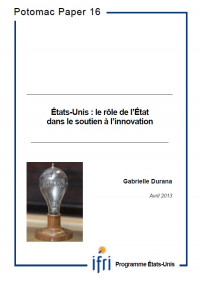Gateway to Think Tanks
| 来源类型 | Publications - Policy Papers - Potomac Papers |
| 规范类型 | 简报 |
| DOI | 978-2-36567-153-8 |
| États-Unis : Le rôle de l'État dans le soutien à l'innovation Potomac Paper, No. 16, April 2013 | |
| Gabrielle DURANA | |
| 发表日期 | 2013-04-09 |
| 出处 | Potomac Papers |
| 出版年 | 2013 |
| 概述 | Even though the private sector brings more funding to innovation programs, the role government plays by hosting and/or funding research projects remains key. Only the public sector can pursue the long term projects with no foreseeable profitability that will enable the next industrial... |
| 摘要 |
États-Unis : Le rôle de l'État dans le soutien à l'innovation Potomac Paper, No. 16, April 2013
Even though the private sector brings more funding to innovation programs, the role government plays by hosting and/or funding research projects remains key. Only the public sector can pursue the long term projects with no foreseeable profitability that will enable the next industrial revolution.  The role government should play in spurring innovation by hosting and/or funding research projects has been debated since the beginnings of the American Republic. After the 1940, and because the country was now vested with international responsibilities, systematic public funding of innovation efforts began in earnest, launching military research projects (such as the Manhattan Project) as well as civilian research projects (such as the Apollo Program). Newly set up networks of public laboratories began interacting with private industrial labs and university labs, thus multiplying technical paths for innovation. Since a distinctly free-market-oriented ideology has begun to hold sway in the 1970s, private funding of innovation programs has become more important ($225 billion in 2009). Public funding remains substantial for military programs ($79 billion in the 2013 budget project), while public funding of civilian research (62 billion) must remain more discreet, in order not to be slashed by Congress. Typical research collaborations now engage private sector and university laboratories. Yet the role of government in the support of research efforts remains strategic: venture capitalists will not fund the very long term research projects with no foreseeable profitability required to set up the next industrial revolution and a potential switch to renewable energies. The United States remains the best funder and actor of innovation, and attracts brilliant minds from all over the World. Still, only a better education system will ensure that this remains true over the long-term. This content is available in French : "États-Unis : Le rôle de l'État dans le soutien à l'innovation" |
| 关键词 | Technology United States |
| URL | https://www.ifri.org/en/publications/enotes/potomac-papers/etats-unis-role-de-letat-soutien-linnovation |
| 来源智库 | French Institute of International Relations (France) |
| 引用统计 | |
| 资源类型 | 智库出版物 |
| 条目标识符 | http://119.78.100.153/handle/2XGU8XDN/415731 |
| 推荐引用方式 GB/T 7714 | Gabrielle DURANA. États-Unis : Le rôle de l'État dans le soutien à l'innovation Potomac Paper, No. 16, April 2013. 2013. |
| 条目包含的文件 | ||||||
| 文件名称/大小 | 资源类型 | 版本类型 | 开放类型 | 使用许可 | ||
| usainnovation_couver(27KB) | 智库出版物 | 限制开放 | CC BY-NC-SA |  浏览 | ||
| usainnovation_pp16_d(1605KB) | 智库出版物 | 限制开放 | CC BY-NC-SA | 浏览 | ||
除非特别说明,本系统中所有内容都受版权保护,并保留所有权利。